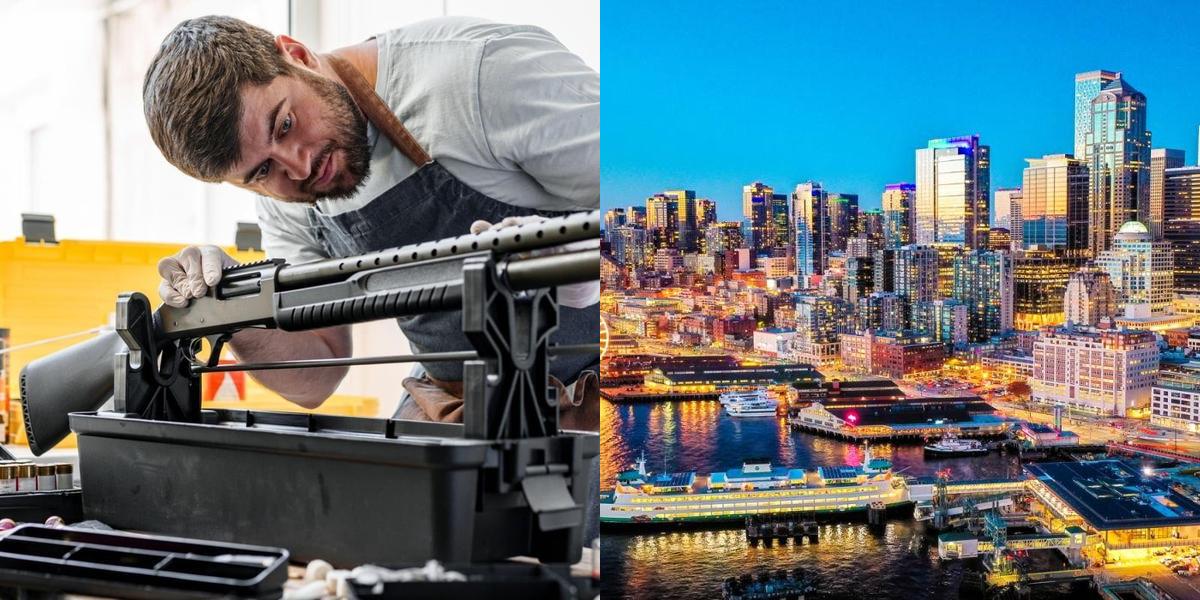How to Become a Gunsmith in Washington (2025)

Gunsmiths are skilled professionals who specialize in maintaining, repairing, and modifying firearms. They possess a deep knowledge of firearms and are proficient in various techniques and tools to ensure the proper functioning of firearms. If you have a passion for guns and want to pursue a career in this field, here's what you need to know about becoming a Gunsmith in Washington.
Career Paths and Opportunities after Becoming a Gunsmith
Becoming a certified gunsmith opens up various career paths and opportunities in the firearms industry. Here are some potential career options:
-
Gun Shop or Sporting Goods Store - Many gunsmiths find employment in gun shops or sporting goods stores. In these settings, you will interact directly with customers, providing services such as firearm repairs, modifications, and customizations. Working in a retail environment allows you to hone your customer service skills and gain exposure to a wide range of firearms.
-
Firearms Manufacturer - Firearms manufacturers often employ gunsmiths to assist with the production and quality control of their firearms. In this role, you may be responsible for assembly, testing, and troubleshooting firearms. Working for a manufacturer provides valuable insights into the manufacturing process and allows you to contribute to the creation of high-quality firearms.
-
Self-Employment - Some gunsmiths choose to start their own businesses and work as independent contractors. This allows you to have full control over your schedule, clientele, and projects. However, self-employment requires business acumen and the ability to market your services effectively.
-
Custom Gunsmithing - Specializing in custom gunsmithing can be a lucrative career path for those with a passion for creativity and craftsmanship. Custom gunsmiths work on unique and personalized projects, such as building custom firearms, engraving, and creating one-of-a-kind designs. This niche field requires a high level of skill and attention to detail.
-
Military or Law Enforcement - Gunsmiths are also sought after in the military and law enforcement sectors. In these roles, you may be responsible for maintaining and repairing firearms used by military personnel or law enforcement officers. This path often requires additional training and certifications specific to military or law enforcement firearms.
-
Educator or Instructor - With the knowledge and experience gained as a certified gunsmith, you can also pursue a career in education. Teaching gunsmithing courses at vocational schools, community colleges, or specialized gunsmithing schools allows you to pass on your skills and inspire the next generation of gunsmiths.
How Much does a Gunsmith Make?
The salary of a gunsmith can vary depending on a variety of factors, including experience, location, and the industry in which they work. On average, gunsmiths can expect to make between $45,000 and $60,000 per year. However, it's important to note that this is just an average, and salaries can vary significantly.
Starting salaries for gunsmiths can range from $20,000 to $30,000 per year. As gunsmiths gain experience and develop their skills, they can expect their salaries to increase. Gunsmiths who have been in the industry for many years and have established a reputation for their work can earn salaries upwards of $80,000 per year.
Frequently Asked Questions
How long does it take to get certified as a gunsmith?
It takes 6 months to 2 years to become a certified gunsmith. Certificate programs can be completed in as little as 6 to 12 months, while associate degree programs typically take about 2 years. Some gunsmiths also gain experience through apprenticeships or on-the-job training.
Can I be a gunsmith without an FFL?
Yes, you can work as a gunsmith without a Federal Firearms License (FFL) if you’re only repairing or customizing your own firearms. However, if you work on guns owned by others or operate a business, federal law requires you to obtain an FFL from the Bureau of Alcohol, Tobacco, Firearms and Explosives (ATF).
What education do you need to be a gunsmith?
There’s no formal degree requirement to become a gunsmith, but most individuals complete a certificate or associate degree in gunsmithing from a vocational school or community college
Final Thoughts
Becoming a certified gunsmith requires a combination of education, hands-on training, and certification. By following the steps outlined in this article, you can embark on a rewarding career in the firearms industry. Remember to continuously learn and stay updated on industry trends to enhance your skills and remain competitive. Whether you choose to work in a gun shop, firearms manufacturing, or start your own business, the possibilities are endless for a passionate and skilled gunsmith.
If you're thinking of a new career path, Dreambound offers in-depth guides to understand various job choices:






